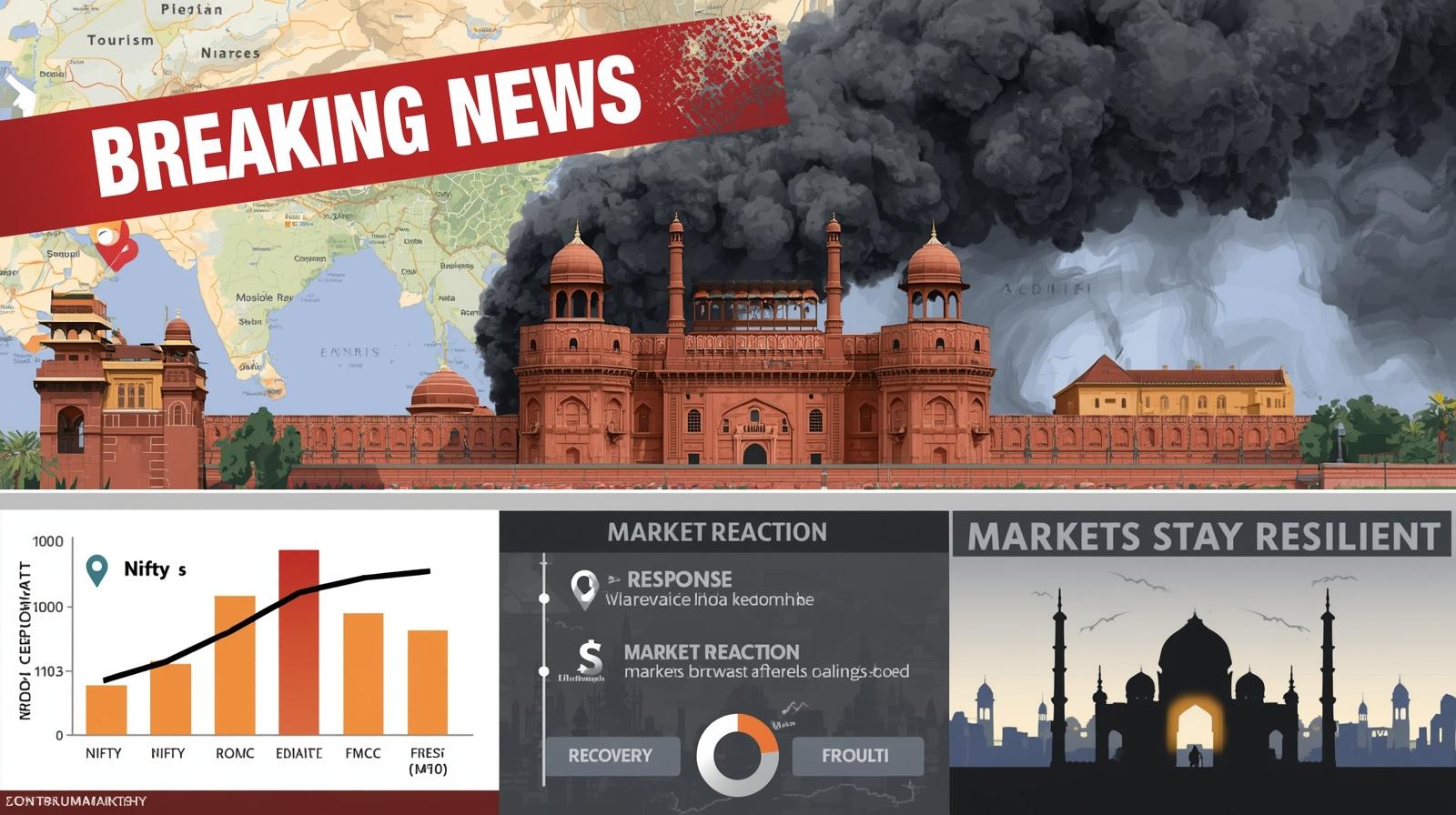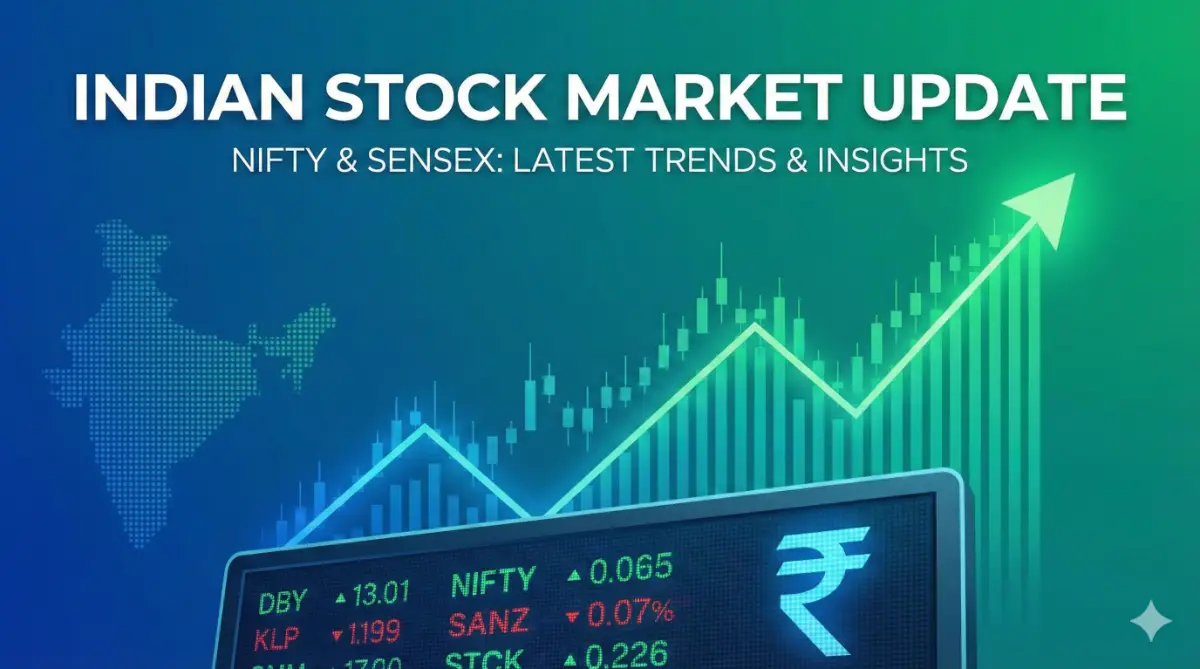Red Fort blast| Delhi car explosion| Delhi security alert| market impact Delhi explosion| India stock market effect terror| Delhi terrorism incident 2025
1️⃣ The Sequence of Events
Timing and Location
At around 6:50 PM, a car stationed near the Red Fort Metro Station Gate No. 1 suddenly exploded. The site lies in one of Delhi’s most crowded corridors — connecting Chandni Chowk, Jama Masjid, and the Red Fort tourist zone.
Immediate Impact
The explosion caused a massive fire, quickly spreading to several nearby vehicles. Flames rose high, black smoke covered the evening sky, and people fled in panic. Eyewitnesses reported hearing a deafening sound, feeling tremors, and seeing multiple vehicles catch fire within seconds.
Casualties
Preliminary reports confirmed at least eight deaths and over a dozen injuries. Victims included pedestrians, shopkeepers, and metro commuters caught in the chaos.
Emergency Response
Within minutes, fire tenders and ambulances rushed to the scene. Delhi Fire Service deployed seven vehicles, and police sealed off the area, diverting all traffic. Metro gates were temporarily closed, and nearby shops were evacuated.
Rescue teams worked for hours to douse the fire, evacuate injured people, and control the crowd. Hospitals in the vicinity were put on emergency mode.
2️⃣ The Investigation So Far
While the cause remains officially under investigation, early clues point to two main possibilities:
- A deliberate explosion – possibly caused by an improvised explosive device (IED) placed in or near the vehicle.
- A mechanical malfunction or fuel blast – such as a CNG cylinder explosion leading to chain fires.
Forensic teams, bomb disposal squads, and the National Investigation Agency (NIA) have joined the probe. Samples have been collected from the blast site to determine the chemical composition and potential triggers.
Authorities are exploring CCTV footage from the area and have increased checks at metro stations, parking lots, and entry points around Old Delhi.
3️⃣ Security and Government Response
Following the explosion, Delhi was placed on high alert. Similar alerts were issued in Mumbai, Uttar Pradesh, Haryana, and Punjab. Security forces increased patrols near airports, metro stations, and government offices.
Actions Taken
- Metro stations in central Delhi underwent strict checking.
- Markets like Chandni Chowk and Sadar Bazaar were temporarily closed.
- Vehicle checks increased at key junctions.
- National Security Guard and Special Cell teams were stationed in strategic points.
The Prime Minister and Home Minister were briefed immediately. High-level meetings were held to assess any possible terror link or organized motive.
Indian Stock Market Update — Nifty, Bank Nifty, Fin Nifty & Midcap Nifty Gain Amid Cautious Optimism
Lesson 8: The Four Faces of the Stock Market
4️⃣ Historical Parallels – Delhi’s Recurring Vulnerability
Delhi, despite being one of the most secure cities in India, has a tragic history of explosions and attacks in crowded zones.
Past Incidents
- 2000 Red Fort Attack: Terrorists opened fire inside the Red Fort, killing three people.
- 2005 Delhi Bombings: Series of blasts in markets and buses killed over 60 people.
- 2008 Serial Bomb Blasts: Multiple explosions across Connaught Place and GK-I killed over 25 civilians.
The current explosion near Red Fort thus reignites painful memories and raises urgent questions about urban security readiness and surveillance near heritage and tourist sites.
5️⃣ The Aftermath – Public Fear & Civic Disruption
The Old Delhi area was immediately cordoned off. Markets shut early, metro gates were sealed, and thousands of commuters were stranded.
Local traders reported that business halted abruptly. Tourists in the Red Fort area were evacuated. The once vibrant evening market turned into a zone of smoke, sirens, and fear.
Public transport services slowed down, and traffic on the Ring Road came to a standstill for hours. The area remained under heavy police presence well into the night.
Residents expressed anger and fear, demanding stricter checks and better crowd control. Many recalled the 2005 Diwali eve blasts, saying the panic felt eerily similar.
6️⃣ Broader Socio-Economic Impact
Impact on Tourism
Red Fort is one of Delhi’s top tourist attractions. The blast, occurring right outside its gates, will likely cause a temporary drop in domestic and international tourist footfall. Travel advisories could affect visitor numbers for weeks.
Impact on Local Businesses
Shops, eateries, and hawkers in Chandni Chowk and Red Fort surroundings faced sudden shutdowns. Retail sales in the area, which normally thrive on tourist and commuter spending, will likely dip sharply.
Transport & Mobility
Metro authorities have tightened security checks, increasing travel times. Car parking near metro stations and markets will be restricted, causing inconvenience to daily commuters.
Public Sentiment
Delhiites woke up to a new wave of anxiety. The sight of burnt vehicles and chaotic visuals circulating online reignited concerns about the safety of public spaces.
7️⃣ The Market Reaction: How Will This Affect Stocks Tomorrow?
The financial markets are highly sensitive to geopolitical and domestic shocks — especially those linked to safety, terrorism, or civil unrest. While this incident is localized, it could trigger temporary nervousness in the market.
Possible Reactions on Opening Bell
- Nifty 50 and Sensex may open 0.5–1% lower, driven by sentiment-based selling.
- Investors may move toward safer assets, such as gold and government bonds.
- Defensive sectors (FMCG, pharma, utilities) could outperform.
If further investigation confirms it as a terror act, the risk sentiment could deepen temporarily.
8️⃣ Sector-Wise Market Analysis
🏨 Tourism & Hospitality
Stocks related to hotels, airlines, and travel agencies may face short-term pressure. Companies with operations in Delhi-NCR could see booking cancellations.
🚗 Transport & Auto
Transport companies, car-rental services, and metro-linked infrastructure may experience temporary disruption. Auto insurance providers could also see short-term claim impacts.
🏢 Real Estate
Developers and property owners in the central Delhi area might face reduced footfall and valuation caution, especially in commercial and retail real estate.
🛡️ Defence & Security
This sector may see positive movement. Companies offering security surveillance systems, defense contracts, and emergency response equipment could gain investor interest.
💼 Insurance
An increase in claims may affect short-term margins, but the long-term impact remains contained. Investors may track claim ratios closely.
9️⃣ Short-Term Market Sentiment: Investor Strategy
The stock market tomorrow will likely be dominated by sentiment and safety perception rather than fundamentals. Here’s what traders should watch:
| Category | Expected Impact | Investor Strategy |
|---|---|---|
| Nifty / Sensex | Slight gap-down open | Avoid panic selling |
| Hospitality & Travel | Negative | Book partial profits, avoid fresh entries |
| Defence & Security | Positive | Consider tactical short-term buys |
| FMCG & Pharma | Stable / Defensive | Safe-haven accumulation |
| Small-cap / Mid-cap | Volatile | Avoid leverage positions |
🔮 Prediction for Tomorrow (11 November 2025)
Nifty Outlook:
Likely to open between -0.6% to -1.2%, depending on overnight global cues and newsflow.
Intraday recovery possible if investigation points to an accidental cause rather than terror.
Bank Nifty:
May show mild pressure, especially if security alerts disrupt metro and transport-linked business activity.
Sector Watch:
Defence, utilities, and FMCG may emerge as short-term defensive plays. Hospitality, retail, and tourism may stay weak for 2–3 sessions.
Investor Sentiment:
Fear-driven but short-lived unless multiple related incidents occur.
🔎 Broader Economic Reflection
While the blast’s human cost is tragic, its economic impact on India’s macro fundamentals will likely remain limited unless it reveals a broader security breach.
However, it highlights critical areas:
- Need for advanced surveillance in urban centers.
- Public safety technology deployment.
- Disaster preparedness in high-traffic zones.
- Corporate risk management for business continuity.
🧭 Key Risk Scenarios Ahead
- Accidental Cause Confirmed: Market rebounds quickly, sentiment stabilizes.
- Confirmed Terror Incident: Defensive buying dominates; risk sectors underperform for 3–5 sessions.
- Multiple Linked Events: Deeper fear wave; volatility spikes sharply.
💡 Investor Takeaways
- Avoid panic — market reactions to such incidents are typically short-lived.
- Watch for official statements clarifying the cause.
- Avoid heavily leveraged intraday trades.
- Use dips in quality defensive stocks as buying opportunities.
- Remain alert to any follow-up security developments.
📈 Broader Lessons for Urban Policy & Market Confidence
This blast underlines the growing need for resilience planning in India’s economic and financial hubs. Investor confidence depends heavily on the perception of stability and security.
Improved surveillance, controlled parking near crowded zones, and robust communication between police and civil authorities can prevent panic and economic ripple effects in the future.
For the financial community, the lesson is clear — unpredictable incidents can spark fear, but structured risk management, sectoral balance, and awareness of defensive positioning can protect portfolios from temporary shocks.
🧠 Summary of Key Insights
- Incident: Car explosion near Red Fort Metro, 8 dead, several injured.
- Response: City and states on high alert, investigation ongoing.
- Economic Impact: Local disruption, temporary drop in tourism and retail.
- Market Impact: Sentiment-driven dip expected; recovery possible if no escalation.
- Sectors to Watch: Defence (positive), Hospitality (negative), FMCG (stable).
- Outlook: Short-term volatility, long-term stability.
Red Fort blast| Delhi car explosion| Delhi security alert| market impact Delhi explosion| India stock market effect terror| Delhi terrorism incident 2025
Final Thoughts
The Red Fort blast stands as another reminder of the delicate balance between security and daily life in India’s bustling capital. The country’s financial markets, though resilient, reflect public emotion in the short run. Tomorrow’s trading session will test this balance — whether fear dominates or confidence prevails.
India’s economy, institutions, and investor base have grown stronger over the years. Even amidst tragedy, resilience remains the defining trait. As investigations continue, the nation once again stands united — determined, alert, and confident that fear will not derail progress.
📢 Join Our Market Community
📱 Stay updated on IPOs, Results & Market News:
- WhatsApp Channel: Join Now
- Telegram: Follow Updates
- Arattai: Connect with Us
📌 Stock Market Disclaimer
- Disclaimer: This post is for informational and educational purposes only and does not constitute financial advice or a recommendation to buy/sell any stock or share. Investing in the stock market involves risk. Past performance is not indicative of future results. Always conduct your own research or consult a licensed financial advisor before making investment decisions.
- The information provided on this platform is for educational and informational purposes only. It should not be considered as investment advice, stock recommendations, or financial guidance.
- ⚠️ Stock Market Investments
- Investing in equities, derivatives, mutual funds, and other financial instruments involves market risks, volatility, and the possibility of capital loss.
- Past performance of stocks or indices is not indicative of future returns.
- Always conduct your own research or consult a SEBI-registered financial advisor before making investment decisions.
- ⚠️ IPO (Initial Public Offerings)
- IPO details, issue size, subscription data, and allotment status shared here are based on publicly available information from company filings, stock exchanges, and merchant bankers.
- Investing in IPOs carries risks including listing volatility, business uncertainties, and sector performance dependency.
- Neither acceptance of applications nor allotment guarantees profits. Investors should evaluate their risk appetite before subscribing.
- ⚠️ GMP (Grey Market Premium)
- Grey Market Premium (GMP) is an unofficial and unregulated indicator of expected IPO listing price.
- GMP data is collected from market observers and informal trading circles; it does not have any legal or SEBI recognition.
- GMP values are highly speculative and may differ significantly from actual listing prices. Investors should not rely solely on GMP while taking investment decisions.
- ✅ General Advisory
- We do not provide any buy/sell/hold recommendations.
- Readers and investors are solely responsible for their investment actions and decisions.
- This platform, its authors, and affiliates are not liable for any direct or indirect financial loss arising from the use of this information.
- 🔒 Always invest responsibly and diversify your portfolio.
Open Demat Account
by Mirae Asset (m,Stock)


-
The Tariff Tussle: Decoding the Legal Challenge to Executive Trade Power
Supreme Court| Tariffs| Trade War 2026| Donald Trump| IEEPA| Section 301| US Economy| Import Duties| Constitutional Law| Reciprocal Trade Act…
-
The 2025-26 Market Journey: From All-Time Highs to the “Retail Trap” Panic
Indian Stock Market Performance 2025-26| Nifty 50 Returns FY26| Why is Market Falling Feb 2026| Hold or Sell Indian Stocks|…
-
Indian Stock Market Update Feb 20: Nifty Reclaims 25,550, Sensex Jumps 316 Pts Amid Global Cues
Indian Stock Market Update Feb 20| Nifty 50 today| Sensex closing| Top gainers and losers Market Snapshot: The Bulls Fight…
-
Indian Stock Market Today: Bulls Charge Ahead as Sensex and Nifty Rally on Banking & IT Strength
# Indian Stock Market Today: Sensex and Nifty Close Higher Amid Broad-Based Buying ## Indian Stock Market Report – Updated…
-
🚨 YouTube Home Page Error 2026: ‘Something Went Wrong’ – Causes, Fixes & Full Breakdown
🚨 YouTube Home Page Error 2026: ‘Something Went Wrong’ – Causes, Fixes & Full Breakdown Trending Keywords: YouTube down, YouTube…
-
Global Market Update 2026: Equities, Commodities, and Indian Rupee Outlook
Comprehensive 2026 global market update covering equities, commodities, bond markets, US Dollar trends, and detailed Indian Rupee outlook with investment themes and risks.



